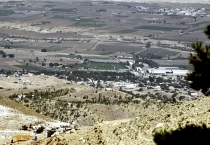Jordan

In Jordan, the WEPS project is implemented in collaboration with the Ministry of Water and Irrigation and the Ministry of Agriculture, and is guided by the multidisciplinary team of the water scarcity initiative that gather key stakeholders interested in water issues (see country team and partners).
Background
Jordan is one of the most water scarce countries. Scarcity is driven primarily by its arid to semi-arid climatic regime and by population increases experienced in recent decades as a result of both natural growth and recent immigration/refugee intake from the crisis in Syria. Of all its water resources, the status of Jordan’s groundwater is of critical concern because its use requires careful planning and management to sustain human socio-economic development and ecosystems. Yet, groundwater resources are under the threat from mismanagement and over-exploitation, linked in particular to the expansion of irrigated agriculture.
Al Mashare area, in the northern Jordan Valley, is considered as one of the poorest areas in the country. As a follow up to the Royal Court initiatives regarding to the preparation of an integrated development plan for the area, FAO agreed with Ministry of Water and Irrigation (MWI) to support the area under the project activities.
